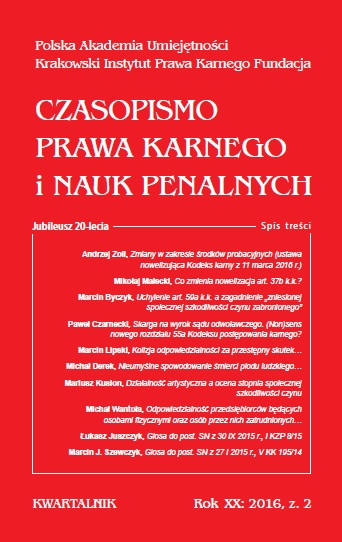Uchylenie art. 59a k.k. a zagadnienie „zniesionej społecznej szkodliwości czynu zabronionego”
The repeal of Article 59a of Polish Criminal Code and the question of the so-called abolished social harmfulness of a prohibited act
Author(s): Marcin ByczykSubject(s): Criminal Law
Published by: Polska Akademia Umiejętności / Krakowski Instytut Prawa Karnego Fundacja
Keywords: discontinuation of the criminal proceedings; reconciliation between the perpetrator and the victim; social harmfulness of an act; amendment of the criminal law
Summary/Abstract: Artykuł problematyzuje kwestie reformy polskiego Kodeksu karnego w zakresie tzw. umorzenia postępowania karnego ze względu na pojednanie się pokrzywdzonego i sprawcy czynu zabronionego. Taka możliwość została wprowadzona do Kodeksu karnego z dniem 1 lipca 2015 r. w nowo dodanym art. 59a k.k. Nowelizacja ta została jednak uchylona ustawą z dnia 11 marca 2016 r. ze skutkiem na dzień 15 kwietnia 2016 (Dz.U. 2016, poz. 437). W uzasadnieniu uchylenia tego przepisu po tak krótkim czasie posłużono się argumentami, które trudno uznać za zrozumiałe. Ich bliższa analiza ukazuje, iż uchylenie art. 59a k.k. jest przejawem populizmu penalnego. Niezależnie od wskazanych braków argumentacyjnych, celem artykułu jest odpowiedź na pytanie, czy w stanie prawnym po 15 kwietnia 2016 r. jest możliwe umorzenie postępowania karnego w przypadku przestępstw o niewielkim ciężarze gatunkowym ze względu na pojednanie się sprawcy czynu zabronionego z pokrzywdzonym. Analiza dogmatyczna i teoretycznoprawna przeprowadzona w artykule doprowadza do wniosku, iż jest tak faktycznie. Podstawą tego wniosku jest konstatacja, iż analizowany czyn nie charakteryzuje się już społeczną szkodliwością w stopniu wyższym niż znikomy. Stąd też, wbrew populistycznym zamierzeniom ustawodawcy nowelizującego Kodeks karny w marcu 2016 r. stan prawny w omawianym zakresie nie uległ zmianie – zmianie uległa jedynie podstawa prawna umorzenia postępowania karnego ze względu na pojednanie się sprawcy czynu zabronionego o niewielkim ciężarze gatunkowym z pokrzywdzonym. The article discusses the issue of the reform of the Polish Criminal Code (k.k.) in respect to discontinuation of the criminal proceedings due to the reconciliation between the perpetrator and the victim of a crime. Such a possibility has been introduced to Polish Criminal Code on 1st of July 2015 by the new Article 59a k.k. Yet this change has been repealed by the Amending Act of 11th march 2016 which entered into force on 15th of April 2016. As for the grounds of this change after such a short period of time, the arguments used hardly can be found reasonable. Thorough analysis reveals that the resignation from Art. 59a k.k. is a sign of a penal populism. However, apart from the scarcity of argumentation, the aim of the presented paper is to found an answer to the question whether after 15th of April 2016 is it still possible to discontinue criminal proceedings concerning the lesser crimes due to the fact that there has been a successful reconciliation between the perpetrator and the victim. Theoretic and dogmatic analysis conducted in this article has led to the conclusion that it is possible. This conclusion is based on statement, that the analysed act is such cases do not have a degree of social harmfulness higher than negligible. From this, despite the populist aims of the legislature amending Polish Criminal Code, the law in above-mentioned cases did not changed – only change is the legal basis for the discontinuation of criminal proceedings due to the reconciliation between the perpetrator and the victim.
Journal: Czasopismo Prawa Karnego i Nauk Penalnych
- Issue Year: 20/2016
- Issue No: 2
- Page Range: 53-76
- Page Count: 24
- Language: Polish

